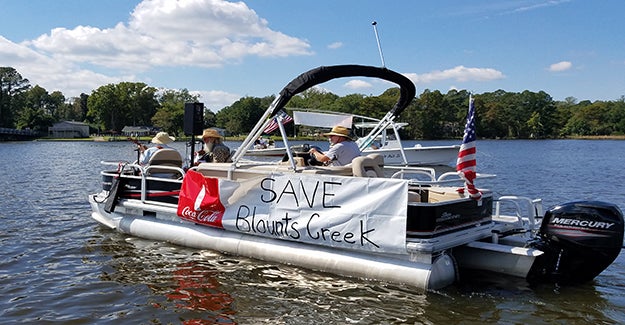Public comment period opens for permit to allow mining company to discharge freshwater into Blounts Creek
Published 4:57 pm Tuesday, August 27, 2024

- Photo and cutline courtesy of Sound Rivers. Blounts Creek residents, business owners and supporters take to the water during a “Save Blounts Creek” boat rally in 2017. The case of the mining company and a beloved creek has bounced around North Carolina courts.
|
Getting your Trinity Audio player ready...
|
Editor’s Note: This article has been updated to reflect a change in address where public comments should be sent.
Hope for clean water and community support are what keeps Sound Rivers and residents of Blounts Creek motivated to continue a decade-long fight against a permit that would allow limestone mining company, Martin Marietta Materials to pump up to 12 million gallons of fresh water into two small tributaries that flow into Blounts Creek, and further, Blounts Bay and the Pamlico River.
“There is a good group of people that are still there from about a decade ago who were in the fight with us during that long legal battle…We do have a good group who are all still very interested in protecting Blounts Creek,” said Katey Zimmerman, a Tar-Pamlico Riverkeeper with Sound Rivers. Sound Rivers is a nonprofit organization committed to protecting the health of the Neuse and Tar-Pamlico river basins. Through grassroots efforts, the organization aims to preserve these watersheds that cover almost a quarter of North Carolina, according to their website.
Since 2011, Martin Marietta has worked to obtain a permit that would allow them to pump up to 12 million gallons of fresh water per day into a natural, brackish tributary stream that is small enough for a person to jump across, Zimmerman said.
Several years ago, they obtained a NPDES (National Pollution Discharge Elimination System) Wastewater permit from the North Carolina Department of Environmental Quality (NCDEQ) for their 649-acre limestone mine.
This prompted Sound Rivers to file a lawsuit which argued that it was unlawful for NCDEQ to approve the permit, because what the permit allows would have a huge and lasting impact on the water quality in Blounts Creek and forever change the current ecosystem – brackish with saltwater species living in the water – to freshwater which is unnatural for coastal plains.
“As it is now, Blounts Creek is a healthy brackish system with saltwater and saltwater species so discharging 12 million gallons per day would completely change that system to a freshwater system and push all of the saltwater species down the creek,” Zimmerman said.
Not only would the 12 million gallons of freshwater impact wildlife, but it would also impact Blounts Creek residents’ well water.
“As Martin Marietta Materials is mining for limestone in the ground past the water table, which is not very low in Beaufort County, they have to do something to essentially get the water out of the way, so they plan to discharge it into two small headwater streams of Blounts Creek. As they remove this high volume of groundwater on their site, though, they are increasing the dramatic drawdown of the Castle Hayne Aquifer. This will lower the water levels of the aquifer and has the potential to impact landowner wells within a seven mile radius. There are currently no protections for landowner wells within their permit,” Zimmerman said.
After years of back and forth in appeals courts, thinking they had won, but then lost again, Sound Rivers ultimately lost against not just Martin Marietta but against the North Carolina Department of Environmental Quality (NCDEQ) who kept defending why they issued an initial permit to Martin Marietta. Because so much time was spent in court, the initial permit Martin Marietta obtained became inactive, according to Sound Rivers’ podcast.
It’s important to note that Sound Rivers has advocated for alternative wastewater discharging methods.
“In the past, Sound Rivers advocated for the alternative that would involve discharging the mine dewatering into a winding ditch system that is miles and miles long before it reaches the Neuse. Something like this would be far less impactful because the water would have much more time to reinfiltrate into the groundwater.Another potential alternative is to use the discharge as irrigation for the trees around the mine. Much of the land is owned by Weyerhouser, which farms trees. These other alternatives that could potentially have many more advantages for water quality have not been given much consideration by Martin Marietta Materials,” Zimmerman said.
Martin Marietta Materials is now applying for a renewal of the NPDES permit. NCDEQ is accepting comments from the public until 11:59 p.m. on Sept. 23.
Comments can be mailed to North Carolina Department of Environmental Quality-DWR Water Quality Permitting Section, 1617 Mail Service Center, Raleigh, NC 27699-1617. Comments can be emailed to program consultant Derek Denard at derek.denard@deq.nc.gov.
If a substantial number of public interest is generated, then a public hearing will be held.





